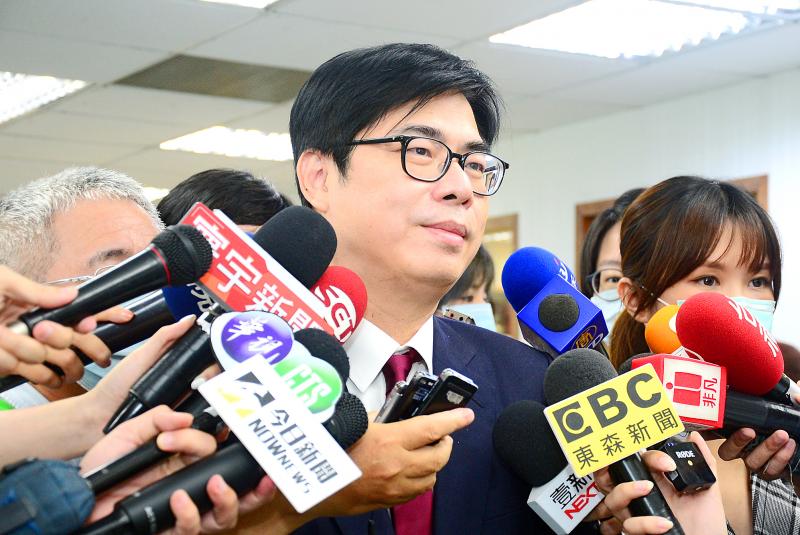The Democratic Progressive Party (DPP) Central Standing Committee yesterday unanimously passed a resolution urging Kaohsiung voters to exercise their right to vote in Saturday’s recall election of Kaohsiung Mayor Han Kuo-yu (韓國瑜).
Regardless of whether they support or oppose the recall, Kaohsiung residents should vote this weekend, the resolution says.
The resolution, proposed by committee member and DPP Legislator Shen Fa-hui (沈發惠), was passed at a meeting presided over by President Tsai Ing-wen (蔡英文), who on May 20 resumed leadership of the party following her second inauguration.

Photo: Wang Yi-sung, Taipei Times
The Constitution guarantees the right to vote and to remove an official from office, the resolution says, adding that as a democratic nation, Taiwan prides itself on its democratic elections — a basic right enjoyed by Taiwanese.
Thanks to the hard work of Kaohsiung’s residents, a recall proposal surpassed a signature threshold and led to the first-ever recall vote of a mayor or county commissioner, it says.
This is a milestone in the history of Taiwan’s democracy and Kaohsiung’s residents have made history, it adds.
Removing an official from office is a basic right of the public and voting is the best expression of civil rights, the resolution says.
Regarding the Chinese Nationalist Party (KMT) calling on people not to vote, but rather to observe the process, the resolution says the DPP believes that this suppresses the development of the nation’s democratic politics and sets the worst example for a freedom that Taiwan has long been proud of.
The DPP asks that its Kaohsiung chapter work toward safeguarding the ability of Kaohsiung’s residents to exercise their civil rights, it says.
Central and local election agencies should handle the voting process and count the ballots, while relevant government agencies should investigate any behavior that hinders voting to ensure Kaohsiung’s residents can safely exercise their right, it adds.
Separately yesterday, Vice Premier Chen Chi-mai (陳其邁), who in 2018 ran against Han for mayor, said that as a native of Kaohsiung, he would return to the city to cast his ballot in the recall election.
As part of the process of putting democracy into practice, voting holds an important meaning, Chen said, adding that people do not vote, others decide for them.
All Kaohsiung residents should vote, regardless of the outcome they support, so that they can express their opinion, he said.
Asked to which side he is inclined to vote, Chen said that the opinions of the city’s residents should be respected.
Resident should decide matters concerning Kaohsiung, he said.
Asked about criticism from Han supporters and a lawsuit over buses being arranged for university students to return to Kaohsiung this weekend, Chen said that Taiwan is a mature, democratic nation and that everyone’s opinion, especially when it comes to voting, should be respected.
Influencing elections through methods such as bullying or violence are illegal, he said, adding that democratic values should be respected.
Asked about reports that some residents have not received their notice to vote and whether it was evidence of an attempt to prevent people from voting, Chen said that he could not speculate on the cause of the alleged incidents.
People exercising their civil rights should be protected by law, he said.

Chinese Nationalist Party (KMT) Chairman Eric Chu (朱立倫), spokeswoman Yang Chih-yu (楊智伃) and Legislator Hsieh Lung-chieh (謝龍介) would be summoned by police for questioning for leading an illegal assembly on Thursday evening last week, Minister of the Interior Liu Shyh-fang (劉世芳) said today. The three KMT officials led an assembly outside the Taipei City Prosecutors’ Office, a restricted area where public assembly is not allowed, protesting the questioning of several KMT staff and searches of KMT headquarters and offices in a recall petition forgery case. Chu, Yang and Hsieh are all suspected of contravening the Assembly and Parade Act (集會遊行法) by holding

PRAISE: Japanese visitor Takashi Kubota said the Taiwanese temple architecture images showcased in the AI Art Gallery were the most impressive displays he saw Taiwan does not have an official pavilion at the World Expo in Osaka, Japan, because of its diplomatic predicament, but the government-backed Tech World pavilion is drawing interest with its unique recreations of works by Taiwanese artists. The pavilion features an artificial intelligence (AI)-based art gallery showcasing works of famous Taiwanese artists from the Japanese colonial period using innovative technologies. Among its main simulated displays are Eastern gouache paintings by Chen Chin (陳進), Lin Yu-shan (林玉山) and Kuo Hsueh-hu (郭雪湖), who were the three young Taiwanese painters selected for the East Asian Painting exhibition in 1927. Gouache is a water-based

Taiwan would welcome the return of Honduras as a diplomatic ally if its next president decides to make such a move, Minister of Foreign Affairs Lin Chia-lung (林佳龍) said yesterday. “Of course, we would welcome Honduras if they want to restore diplomatic ties with Taiwan after their elections,” Lin said at a meeting of the legislature’s Foreign Affairs and National Defense Committee, when asked to comment on statements made by two of the three Honduran presidential candidates during the presidential campaign in the Central American country. Taiwan is paying close attention to the region as a whole in the wake of a

OFF-TARGET: More than 30,000 participants were expected to take part in the Games next month, but only 6,550 foreign and 19,400 Taiwanese athletes have registered Taipei city councilors yesterday blasted the organizers of next month’s World Masters Games over sudden timetable and venue changes, which they said have caused thousands of participants to back out of the international sporting event, among other organizational issues. They also cited visa delays and political interference by China as reasons many foreign athletes are requesting refunds for the event, to be held from May 17 to 30. Jointly organized by the Taipei and New Taipei City governments, the games have been rocked by numerous controversies since preparations began in 2020. Taipei City Councilor Lin Yen-feng (林延鳳) said yesterday that new measures by